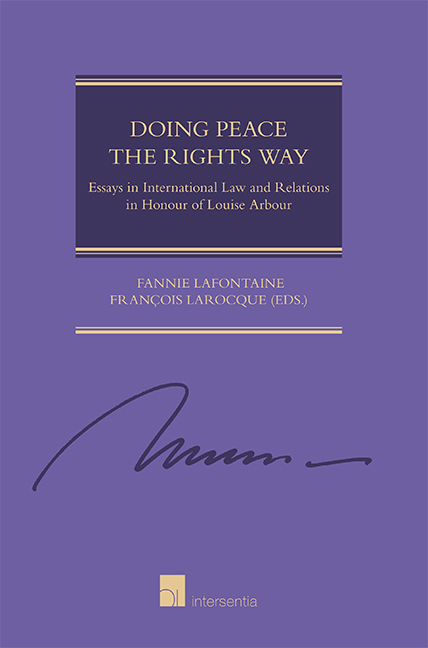An Interview with the Honourable Madam Justice Louise Arbour
from An Interview with the Honourable Madam Justice Louise Arbour
Published online by Cambridge University Press: 13 April 2019
Summary
Ottawa Law Review [OLR]: What initially inspired you to study law?
Louise Arbour [LA]: Nothing, in short. I was raised here in Montréal and I went to a classical college. In fact, when I started there it was a girls’ convent school.
So I have a BA with a classical background, and what you did after that, at least what women typically did since I was in an all-girls school until after I finished my BA, was either medicine, law – I don't think anybody ever thought of engineering – and some would do a graduate degree in history or literature and then go and teach. So the avenues were very narrow. I didn't know any lawyers or judges, there were none in my family, and I had no idea what law was really about. But I had eliminated all the other options and so I went into law very much by default, thinking of it as a continuation of my general education with what I thought at the time may lead to a career in either journalism or politics. And then by Christmas of first-year, I knew it was really for me – I thought law was just a perfect fit. And I had done much better in law school than I had done in undergrad. It was a miracle they even accepted me – in those days they were not very discriminating. I was always a good student, but not fabulous, and I was no longer very interested in the girls school environment when I graduated. But law school, no question, it was made for me.
OLR: After law school 11 you went on to clerk for Justice Louis-Philippe Pigeon at the Supreme Court of Canada.
We'd like to hear about your clerking experience, starting with what the hiring process was like for clerks at the time.
LA: It was actually quite interesting. First of all, I had heard about it from I think a poster in the bar admission course and somebody had told me that a guy named Gérald Tremblay 4 had done it and I think I spoke with him about his experience. I had never been to Ottawa and in fact hadn't had much contact with English Canada in those days. I had been to France a couple of time but never much west of Québec.
- Type
- Chapter
- Information
- Doing Peace the Rights WayEssays in International Law and Relations in Honour of Louise Arbour, pp. 471 - 506Publisher: IntersentiaPrint publication year: 2019

